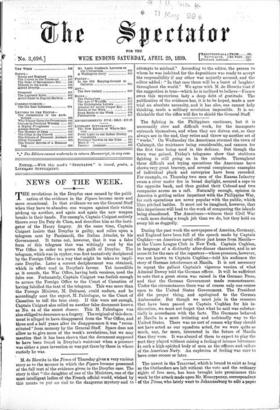During the past week the newspapers of America, Germany, and
England have been full of the speech made by Captain Coghlan—an American naval officer just home from Manila-- at the Union League Club in New York. Captain Coghlan, in language of a distinctly after-dinner character, and in no sense fit for the ears of the reporters—whose presence, however, was not known to Captain Coghlan—told his audience the story of German interference at Manila. It is not necessary to repeat the gallant Captain's vigorous version of what Admiral Dewey told the German officer. It will be sufficient to note that a great storm was raised in the German Press, and that the German Government made remonstrances. Under the circumstances there was of course only one course open to the United States Government. The President did the proper thing, and apologised to the German Ambassador. But though we must join in the censures that have been passed on Captain Coghlan for his in- discretion, we must not forget that what he said was substan- tially in accordance with the facts. The Germans behaved at Manila in a most irritating and unfriendly way to the United States. There was no sort of reason why they should not have acted as our squadron acted, for we were quite as much, nay, far more, interested in the future of Manila than they were. It was absurd of them to expect to play the part they played without raising a feeling of intense bitterness In such a high-spirited body of men as the officers and sailors of the American Nay. All explosion of feeling was sure to have come sooner or later.






















































 Previous page
Previous page